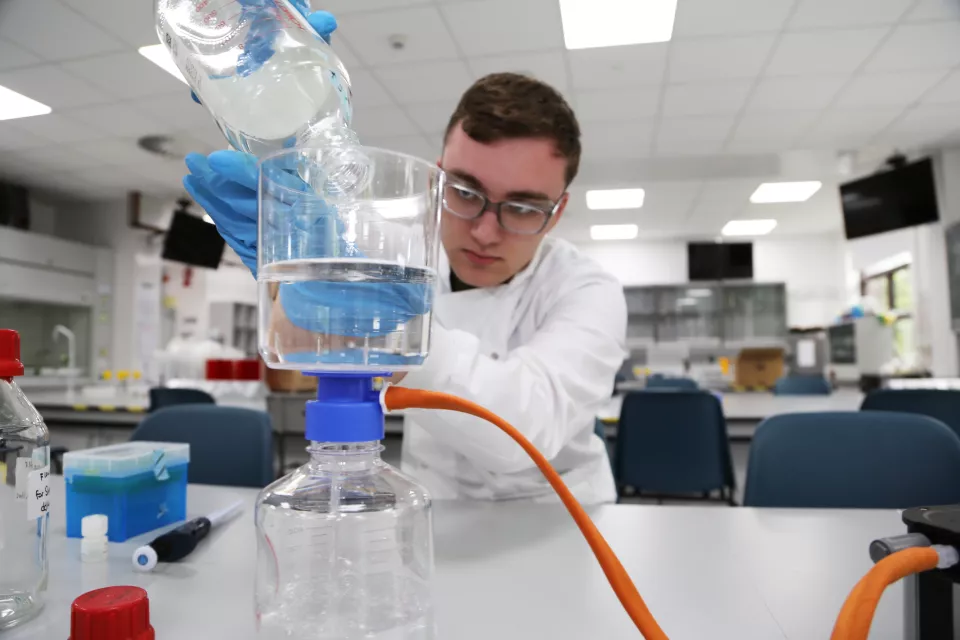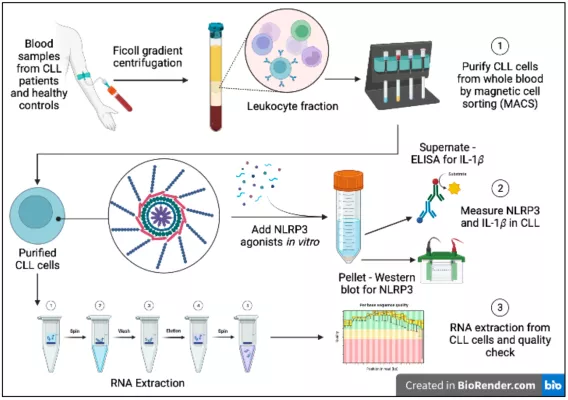
Course: BSc Bioscience
Supervisor: Dr. Elizabeth Ryan
Name of Research Project/Activity: Evaluating NLRP3-dependent IL-1𝛽 production by chronic lymphocytic leukaemia cells (CLL) in vitro.
Q) Can you tell me a bit about yourself, your background, and why did you decide to study the course you are taking at UL?
My name is Brian Gleeson and I am a 4th Year BSc Bioscience student at the University of Limerick. I completed my Cooperative Education internship at Regeneron Pharmaceuticals in Raheen, Limerick, working with the Upstream Process Sciences Lab Team. I am a recipient of the UL Science and Engineering Research Bursary 2021 and Kevin A. Hayes Memorial Award 2020 for Outstanding Academic Achievement.
I first became interested in the life sciences while studying Leaving Cert Biology in secondary school. My teacher was a UL alumnus holding a PhD in Biology and Chemistry Education. She inspired me to complete the BSc Bioscience programme at the University of Limerick. During this course, I have completed modules in cancer biology, immunology, neuroscience, molecular biology, and biotechnology, which I have found fascinating and worth pursuing beyond undergraduate level. I have successfully applied for the MSc Biomolecular Sciences programme in UL, which will commence in September 2023.
Q) What motivated you to apply for the Summer Bursary Programme?
I successfully applied for the 2021 UL Science and Engineering Research Bursary and thoroughly enjoyed the experience. I am completing this Summer Bursary Programme to help my supervisor Dr. Elizabeth Ryan develop her research team at UL. This bursary will allow us to participate in a large international consortium led by RIKEN Institute Japan. We will generate preliminary data that will lead to a high impact collaborative publication. This will allow us to secure future research funding and will strengthen my future PhD application to the Irish Research Council.
Q) What are you doing as part of your research here at UL?
My research is exploring the role of an inflammatory protein complex called the NLRP3 inflammasome in chronic lymphocytic leukaemia (CLL), a type of blood cancer most common in geriatric patients. The inflammasome causes cells to make immune signalling proteins called cytokines, which include interleukin 1 beta (IL-1𝛽). I have started by preparing a literature review on the role of pathogen recognition receptor activation and COVID-19 infection in chronic lymphocytic leukaemia patients. Currently (June 2023), we are preparing the laboratory to receive blood samples, which involves equipment maintenance, completion of training and risk assessments, and writing standard operating procedures.
I will prepare and study blood samples from CLL patients and hemochromatosis controls. Blood will be fractionated by Ficoll gradient centrifugation. I will purify CLL cells using magnetic cell sorting (MACS). CLL cells will be activated in vitro using NLRP3 agonists, which include alum, STING DNA, and Toll-like receptor 7 (TLR7) agonists. I will measure the response of CLL cells to NLRP3 stimulation by collecting cell culture supernatant and quantifying interleukin-1𝛽 production by enzyme-linked immunosorbent assay (ELISA). I will use the cell pellet to quantify NLRP3 protein levels by Western blot. I will then extract and validate the quality of RNA from purified CLL cells prior to sample processing as part of an international collaboration measuring novel long non-coding RNAs in CLL. I will correlate NLRP3 and IL-1𝛽 levels across different CLL patient samples and healthy controls, to determine significance using appropriate statistical tools (Student’s t-test, ANOVA) in GraphPad Prism.

Q) What skills have you developed over the summer?
I have received training in key molecular biology techniques including PBMC isolation, cell purification, flow cytometry, cell culture, ELISA, western blotting, and RNA isolation. I have been given the responsibility to manage laboratory organisation, safety, and inventory. I have also learned about the process of publication and peer review, as I am currently seeking to submit a review article drafted during my FYP for publication. I aim to further improve my communication skills by submitting an abstract to the Irish Association for Cancer Research Meeting in December 2023, which will be drafted using data acquired during this summer research project.
Q) What has this experience taught you and what would you recommend it to others?
This Summer Bursary Programme has shown me that science is so much more than working in the lab and making discoveries (This is what attracted me in the first place!). I have gained a broader understanding of the “job description” that accompanies a research position. I have learned that a successful research career involves making connections with clinical collaborators in the medical and other translational professions, presenting and networking at conferences, securing research funding through grant applications, managing lab budgets and finances, contacting journals and publishers, submitting papers for peer review, and negotiating with suppliers. Above all, I have learned that teamwork and communication are essential for success in research, both within and between research groups working in the same lab space with shared equipment and resources.
I would highly recommend that any science or engineering student consider applying for this Summer Bursary Programme.
Q) What are your future career plans, would you consider a career in research?
I am interested in pursuing a career in research. The field of immuno-oncology is certainly a fascinating area that I would love to spend more time studying.
I submitted an IRC application in October 2022 for a structured PhD which narrowly missed out on shortlisting. I approached my supervisor with the possibility of using this Summer Bursary Programme to build my research skills and strengthen my future IRC application. We will provide purified leukaemia cells to a research collaborator in Japan, who will perform sequencing analysis to identify novel long non-coding RNAs that are involved in chronic lymphocytic leukaemia (CLL), over the next 12 months. I plan to submit another IRC application building on this research. My proposal would seek to validate novel micro RNA (miRNA) targets that regulate inflammation in CLL as one aspect of a PhD thesis.
